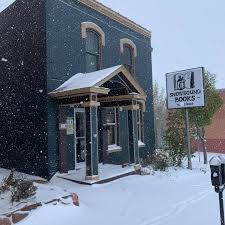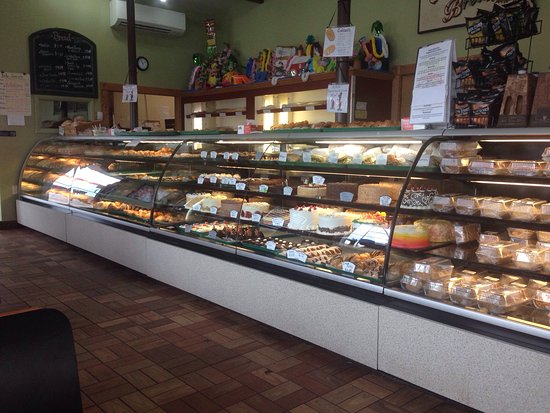IT’S DIFFICULT TO find anybody in the Upper Peninsula–individuals, businesses, institutions, or non profits–who hasn’t been crippled economically by the COVID-19 shutdown.
The big boys have gotten most of the headlines. Namely…
Cleveland Cliffs, with 700 workers soon to be laid for two months because of reduced demand.
NMU, anticipating a 10% drop in enrollment this fall, resulting in a loss of $9 million.
UPHS, reducing hours and cutting salaries because elective surgeries–big moneymakers–have been postponed.
But then there’s the small businesses–what many consider the “backbone of America.” Almost all of them in the UP are hurting, some are getting help from the federal and state governments, but some may never recover.

Snowbound has remained open, but customers aren’t allowed inside.
Snowbound Books. They’ve remained open throughout the crisis. At one point, they were taking only online orders. Now they’re shipping and delivering locally. Business is 60% of what it used to be.
“I’m taking it day by day,” says owner Dana Welshans. “That’s all I can do.”
She’s retained her four employees, plus herself, on the payroll, and Snowbound has been approved for a Payroll Protection Program (PPP) loan. It’s federal money that guarantees pay for her employees and other expenses if she keeps them on her payroll for eight weeks. They’re “loans” technically but they’re forgiven after the eight weeks.
Welshans also applied for state money from the MEDC but was, like most applicants, turned down.
Upper Peninsula Children’s Museum. Executive director Nheena Itner also lost out on the MEDC money but she, likewise, is receiving PPP money, and she’s grateful for it.
“We’re living through some crazy times,” she says. “I’m just happy we can keep people on the payroll through the end of June.”
The museum remains closed down.
Dan Perkins Construction of Ishpeming is also shut down. Fifteen workers idled. But Perkins, while being denied MEDC money, also qualified for PPP funds. Almost $15,000 worth, which will keep him and his workers afloat for now.
“Losing part of the construction season has been devastating to us,” he says, “but I think we’re going to be all right. The money will help us.”
Perkins is hoping his company can reopen in two weeks. They’ve got a large backlog of jobs to tackle.
Perkins’s wife Pam runs Rare Earth Goods & Cafe, which also received a PPP grant, as did Partridge Creek Farms, the much-praised farming education program.
Vango’s. The popular Third Street restaurant is also receiving PPP money but for now remains closed down, with the hope to maybe reopen curbside service at the end of the month.
If Governor Whitmer gives the okay in May, they’d then reopen the restaurant to diners inside.
“We’d probably phase it in,” says co-owner Michele Butler, “as we see what the comfort level is for both our customers and our employees.”
Forty employees in all at Vango’s. They’ll be rehired–with the PPP money–as the need for them arises. The volume of business will determine that.
Farmer Q’s. The little grocery and produce store in south Marquette, fortunately, hasn’t been damaged much by COVID-19. More masks and sani-wipes are in use, but business has been steady. Co-owner Susan Brian says they aren’t applying for government help.
“We’ve been pretty lucky,” she says. “We don’t really need the help. Save it for somebody who does really need it.”
It’s a family-owned business, and payroll is limited.

Huron Mountain Bakery is operating with a skeleton staff.
Huron Mountain Bakery in Marquette and Ishpeming, and Babycakes in Marquette. A mixed bag for owner John Scheidt, who’s also got an opinion or two.
Scheidt has closed Babycaskes and the Ishpeming store, but has kept Huron Mountain in Marquette open during the crisis. Normally, he’s got 60 employees; now only eight are working.
He started the application process for the Payroll Protection Plan but then he stopped it. “I doubt if I’ll ever go through with it,” he tells you. “The loans might be forgiven, but you never know. It can be a slippery slope when the government’s involved.”
For now, he and his few, remaining working employees are struggling through the tough times. Revenue is just a fraction of what it had been.
“For the first time in my career, I can truly say I don’t know what’s going to happen,” he says. “It’s scary. I wake up at three in the morning, and my jaw is clenched.”
It’s not just the lost revenue for these businesses. It’s the uncertainty. When will the economy open up again? Will the customers all come back? Will there be a recurrence of COVID-19 and another shutdown?
Will the businesses survive?

SURE SEEMS LIKE Sawyer International Airport will survive.
Airports across Michigan recently received nearly $300 million in COVID-19 relief to help them through this crisis.
Sawyer got a whopping $18 million of that. By contrast, the next largest airports in the UP received just over $1 million in relief funds. (Some might say it’s about time Sawyer got a break from the Feds since the other airports receive federal subsidies and Sawyer does not.)
So what to do with this $18 million?
“We’re still trying to navigate the details for this relief package,” says airport manager Duane Duray. “I’ve got a call into the FAA to see exactly how we can use it.”
Aircraft operations are way down, passenger loads are way down, and the airport is incurring some expenses, but probably not $18 million worth. Could the relief funds be used for construction projects around the airport?
That’s what Duray is hoping to learn in the days ahead.


